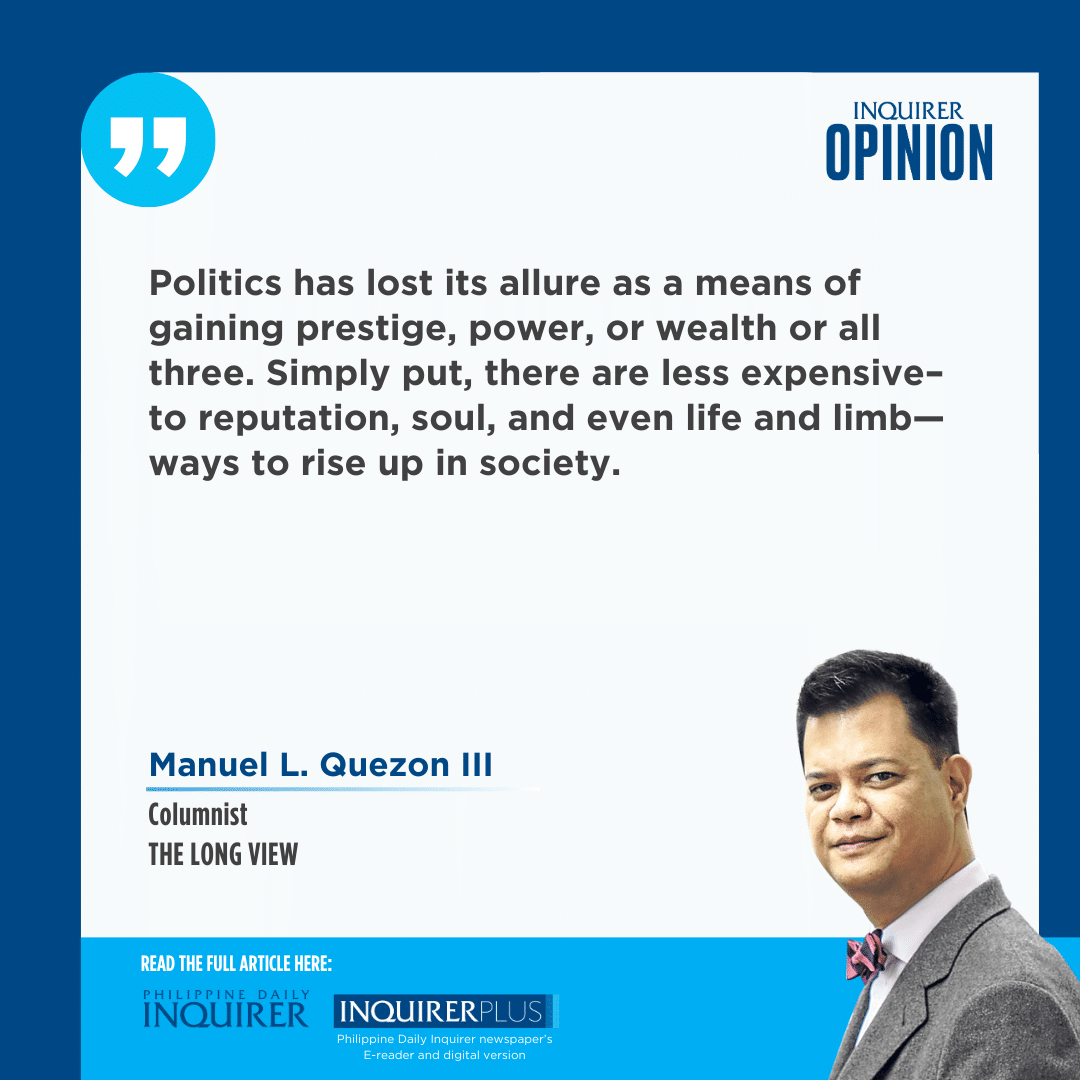Supporting evidence

Something interesting was by a site called Data Dictionary last Nov. 10. It said, “Philippine elections next year will see the least number of candidates running for office since at least 1998, Commission on Elections (Comelec) data show. Declines in candidacies are not equal, and happening mostly at the House of Representatives and down.”
The last part, about the declines happening mostly at the House of Representatives and down, almost exactly ties in with the situation of our domestic politics as I’ve been pointing out, literally, for years.
Nathan Quimpo writing in 2021, put it this way. Political families facing term limits had three choices: go solo, work in tandem with an ally, or keep it in the family. For Quimpo, going solo means that, “upon reaching the limit of allowable terms simply runs for another position or takes a leave from politics, then returns to run again for the same old position. He or she does it on his or her own, and does not enter into an agreement with another politician who would assume the former’s position during the former’s absence.”
To work in tandem involves two possibilities: “In the first, the ally agrees to simply ‘fill in’ for the incumbent and to ‘return’ the post at the end of the term. The second type involves a swapping of posts and later a swap-back or switch-back.” To keep it within the family, “a politician either ‘passes on’ his or her electoral post to a spouse, sibling, son, daughter or some other relative, or just asks the latter to ‘mind the store’ while the former is gone. Often, a politician who wins a higher position does not go back to his old position.”
Here enters some things that, to me, is a kind of recurring theme in our present Fifth Republic: the law of unintended consequences. Quimpo observed that, “In many areas, preventing one person’s monopoly of power has helped paved the way for the concentration of power in political families and clans instead.” Ronald Mendoza studied this phenomenon extensively but missing from the labors of academics is the political reason for this phenomenon: in the old days, someone holding on to a position, might do so for so long, the electorate would vomit them out before they could engineer a successful succession; or, a succession might take place, but the successor would be found so wanting as to suffer defeat at the hands of the first serious outsider challenge.
But as the recent Comelec data shows (and which I’ve been mentioning ever since it was first mentioned to me by an actual politician after the 2013 midterms), politics has lost its allure as a means of gaining prestige, power, or wealth, or all three. Simply put, there are less expensive–to reputation, soul, and even life and limb—ways to rise up in society. You must combine this with another set of data: the actually rather huge percentage of Filipinos who migrate domestically: slightly more than half of all Filipinos will migrate internally. For politicians, this is a disruption: it weakens and even shatters, the carefully built and nurtured web of relationships that local politics aspires to create. In its place, it either leads to greater competition for an actually shrinking electorate (if migrants still go home to vote, or don’t bother in their new locality) or could even lead to more mercenary voters who are purely transactional on election day.
The solution to this is something that has already been previously reported and thus, revealed: the increasing number of unopposed candidates. For this to happen, deal-making is required, itself a function of necessity: the political families have to divvy-up positions with other dynasties that in the past might actually have competed with them. Because elections are so expensive, the electorate, so fickle, the rewards, so slim, only those used to it still find the whole thing attractive. To be sure, there are still newcomers. There have been reports of the growing number of ex-police officers entering politics which in turn, leads to discussions over unknown outsiders entering politics because only they, by having access to rackets of some sort, have the cash required to fund their candidacies–enterprising cops, it’s been suggested, are well positioned to be part of this new game.
This is what it meant when the President expressed surprise when Alice Guo first made the news, remarking that none of the political families seemed to know who she was. This is the sort of thing that sets off alarm bells among those used to ruling the roost: it reveals a fundamental disorder in things. The result is the crackdown we’ve seen.
—————
Email: mlquezon3@gmail.com; Twitter: @mlq3




















